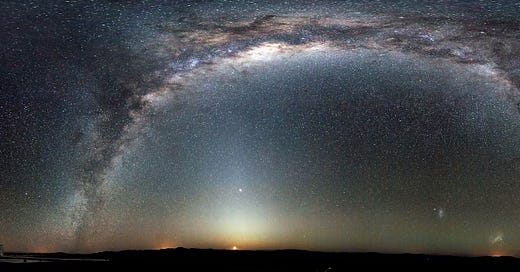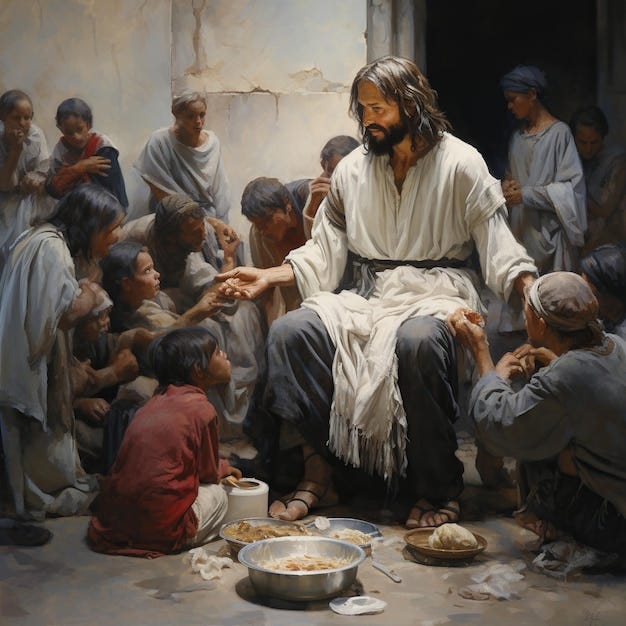Some people find God in a book. I found the Divine in a river winding through a native forest, in a fungal spore, in the tremble of my son’s first breath, in the quiet physics of a dying star. My path has never been narrow, and I’ve stopped pretending it needs to be.
Lately, I’ve been on the receiving end of the usual well-meaning spiritual drive-by: Repent, for the Kingdom is near. Stop reading and writing big words. Drop the witchcraft and get a real god. The implication is always the same. Your way is hollow, and mine is Truth™.
But let me be clear: I’m not writing this because I owe anyone an explanation. I’m writing this because spiritual plurality deserves to be said out loud, with clarity and with teeth. I’m writing this because belief, when filtered through fear and colonial frameworks, becomes a cudgel. I’m writing this for every person who has been told their beliefs don’t matter or are wrong. And I’m writing this because I want to tell you what I actually believe, not to convert you, but to claim my own ground in a world that keeps trying to paint over it.
I Believe That the Divine Is in Everything. And Everything Is in the Divine.
Pantheism says the Divine is within all things. Panentheism says all things are within the Divine. I hold both in tension, like lungs and ribs. There’s no contradiction here, just complexity. And that’s something I’ve always trusted more than a single, righteous line.
To me, the sacred isn’t confined to a throne in the clouds or a single prophet’s name. It’s in soil, in synapses, in salt. It’s in the stars and in the rot. I can kneel at an altar or press my forehead to the bark of an old tree and feel the same thing. The difference is irrelevant. What matters is what it teaches me about humility, about reciprocity, about the scale of time, and the sacred responsibility of being alive.
And when I think about the Divine, I don’t just mean something hovering above creation. I mean the process itself. The birth, the heat, the collapse. The Big Bang wasn’t the beginning; it was a breath. One in a cycle of inhales and exhales so vast and recursive we can barely grasp it. Every atom we carry comes from the debris of stars. Every law of physics is an echo of something that exploded into being, scattered, cooled, combined, collapsed, and will again and again.
Eventually, the last black hole will devour its final star and fold in on itself. The universe will contract into a point of infinite density. A zero-sum. The void before the next breath. And then it begins again. Not once. Not five times. Not 177 times. Infinitely. Existence itself is a repeating gesture, a rhythm older than language. That is not random. That is not mechanical. That is sacred.
If that’s not evidence of something holy, I don’t know what is.
When I say I believe in the Divine, I don’t mean a man in the sky handing out moral report cards. I mean the pulse of the universe itself. I mean emergence, recursion, entropy, genesis, decay, rebirth. You can call it God, or don’t. The naming is less important than the listening.
And in that listening, I’ve never once heard a voice tell me to gatekeep awe or shrink wonder into doctrine. What I hear instead is: Pay attention. Be kind. Keep learning. Let your values be bigger than your ego. Leave the world a little softer than you found it.
Science Is Not the Enemy of Spirit.
People love to pit science and spirituality against each other like mismatched boxers in a pub fight. But anyone who’s actually studied anatomy, cosmology, or evolutionary biology knows the sheer improbability of existence itself is an ecstatic thing. We are living fractals of ancient stardust. Our mitochondria are the descendants of symbiotic bacteria. Our bones carry the spiral patterns of ancient tides.
Every time I’ve laid hands on a body as part of death work, or held an ancient, prehuman skull in my hands, or felt a presence too powerful to name in the middle of a mundane day, I’ve known: Spirit and science are not enemies. They are different languages for the same wonder.
As an anthropologist, I was trained to observe without collapsing things into binaries. I learned that people will always make meaning, and that the shape of that meaning varies wildly by time, geography, trauma, and tradition. No one gets the whole picture. No one’s system is exempt from scrutiny.
That doesn’t mean all beliefs are equally kind or harmless. It just means that the truth is contextual. That gods are social as well as spiritual. That the myth of objectivity has always been a tool of empire and that belief systems should be judged, not by their metaphysics, but by what they justify in the material world.
I Practice Witchcraft. I Talk to Ancestors. I Believe in Justice. These Things Are Not Incompatible.
Spirituality, for me, is not just about salvation. It’s about presence. It’s about accountability. It’s about remembering that the world is alive, and that we’re part of it, not above it.
Yes, I burn herbs and make healing potions. Yes, I speak with the dead. Yes, I pour offerings to ancestors. But I also organise food parcels, write policy briefs, teach equality, and advocate for collective liberation. My path isn’t escapist. It’s embedded. It’s relational.
And if someone’s idea of God requires rejecting everything I just said, I’d gently suggest their God is too small.
I believe in Jesus, too. Not as a cosmic dictator or Divine middle-manager, but as a prophet, a healer, a shaman, a rebel, a feminist, and a spiritual and political insurgent who lived and died in radical solidarity with the poor, the sick, and the excluded. A man who flipped tables and challenged empires, and who spoke in parables because sometimes poetry is the only way to deliver truth without getting executed before the work is done. To me, Jesus walks in the same current as other ancestral teachers, those who held ceremony under stars, who laid hands on wounds and meant it. His medicine still hums through time, not because of orthodoxy, but because of presence.
And I believe in Mary, too, not only as a mother, but as an embodiment of the holy Feminine in its fiercest and gentlest forms. She is the tender pulse at the heart of grief and devotion. She is the symbol of a love that holds vigil even in the darkest hour, even at the foot of a cross. When I think of Divine love, I picture Mary weeping and holding broken bodies. That kind of love is not passive. It is active, radical, and deeply political. In her, I see every woman who has waited up for the missing, who has fed others before herself, who has made holy the work of care. Her story, like his, reminds me that the sacred lives where there is pain and courage and persistence and that reverence does not belong to dogma, but to those who show up.
I’m Not Afraid of Hell. I’m Afraid of a World Without Empathy.
Let’s talk about values. Because that, to me, is the real axis of belief.
I don’t care what you call your god, or if you even have one. What I care about is how you treat people. Whether you weaponise your scriptures or embody your ethics in real-world practice. Whether you show up for the vulnerable, the messy, the grieving, and the poor without trying to convert them. Whether you choose fear or compassion. Whether your worldview serves empire or liberation.
Some people want an afterlife. I want a life that matters now.
You don’t get to corner the market on revelation. Your God didn’t file a patent. If you find comfort in Christ, beautiful. Truly. But if that comfort comes with contempt for everyone else, it’s not faith - it’s ego.
I hold my own spirituality with reverence and with skepticism. I’m agnostic about a lot. I like being agnostic about a lot. It means I stay open. It means I keep learning. I can honour the wisdom of many paths without needing to crown one the winner. And I don’t need to be right to be whole.
This Life Is the Test. This World Is the Sacred Text.
If you want to know who someone is, don’t look at their afterlife. Look at how they show up here. In this mess. In this beauty. In this grief.
I’ve been told I’m spiritually lost. But I would argue I am more found than I’ve ever been. I walk with spirit, not for the promise of heaven, but because it’s the most honest way I know to love this world while I’m in it.
I’m not asking anyone to believe what I believe. I’m just asking for space to believe it without being told I’m damned.
And for those of you who have been shamed, sidelined, or spiritual-bypassed by the righteous? You’re not alone. You’re not crazy. And your god, if you have one, isn’t judging you nearly as harshly as they are.
Because the Divine I know would rather see bread and fish shared than dogma preached. The Divine I know doesn’t ask for your obedience, just your presence, your compassion, and above all else, your love.
And if I’m wrong? If I’ve misunderstood the rules of the cosmic game?
Well. I’d rather be judged for loving too widely than fearing too much.




